|
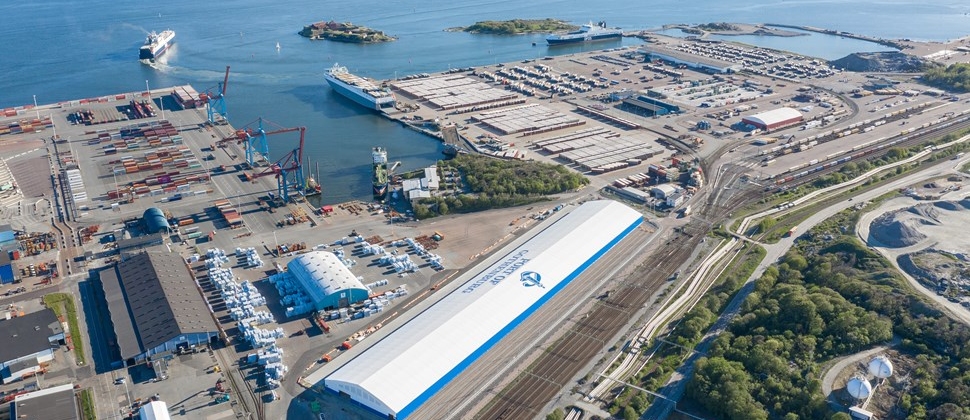
Port of Gothenburg Announces New Transshipment Terminal Soon To Become Operational
July 22, 2020 - A new transshipment terminal, located between the Port of Gothenburg container and ro-ro terminals, is gradually emerging. The terminal will receive incoming forest products by rail from Swedish mills and then transfer the products to containers for onward transport to various parts of the world. Volumes equivalent to 60,000-100,000 twenty-foot-equivalent units will be handled at the terminal each year.
The terminal, named the Svea Terminal, will offer 45,000 square metres of storage space. Around half the area, 21,600 square metres, is covered by the world’s largest storage tent, which was recently erected.
On the inside, the goods can be loaded into weather-protected containers and the area will be used partly for intermediate storage. The tent measures 360 metres by 60 metres and is up to 15 metres in height. The steel beams that support the tent weigh 450 tonnes.
“It’s not exactly a camping tent, but rather a fully equipped storage facility that meets all our demands and specifications, and at the same time offers a cost-effective operating solution,” said Arvid Guthed, Vice President Port Development, Gothenburg Port Authority.
World-class rail volumes
The terminal has rail connections and can house a 350-metre train. By doing so, sensitive products such as pulp and paper rolls can be transported directly into the facility by rail, where under cover they are transferred into a container before being loaded on board the ship.
At present around 60 per cent of the Port of Gothenburg container volumes arrive at or leave the port by rail. A figure that makes the Port of Gothenburg world-class in terms of rail operations.
“This is the result of the long-term investment in the Railport concept, which connects the whole of Sweden to the Port of Gothenburg by rail,” said Claes Sundmark, Vice President, Sales & Marketing, Gothenburg Port Authority.
Investments include the current expansion of the double-track Port Line and construction of the Arken Combi Terminal, which has already led to a substantial reduction in road traffic in Gothenburg. A further investment is APM Terminals’ modernisation and capacity expansion on its marshalling line, where trains are loaded and unloaded inside the container terminal.
Climate-friendly investment
The Port of Gothenburg has also adopted one of the world’s most forward-thinking climate goals where they have undertaken to reduce the whole of the port’s carbon emissions by 70 per cent through to 2030. One of the ways of achieving this goal is to continue investing offensively in the Railport concept in an effort to increase the proportion of rail-borne freight even further.
“The Svea Terminal is ideally suited to realising this ambition. The Terminal will increase rail capacity even further and we will be able to double forest product volumes arriving at the port by rail. It also means that we can reduce the port’s climate footprint and provide further conditions that will allow our customers to make climate-smart choices,” said Claes Sundmark.
Experienced operator
When it comes to operating the terminal, a highly proficient company with many years’ experience of transshipment at the Port of Gothenburg has taken on the task.
“With our experience and the good preconditions at the terminal to facilitate effective crossdocking and transshipment of overseas freight, the terminal will be a major asset for the port and the Swedish forest industry,” said Mikael Bergman, MIMAB chief executive.
SOURCE: Port of Gothenburg |
|
|
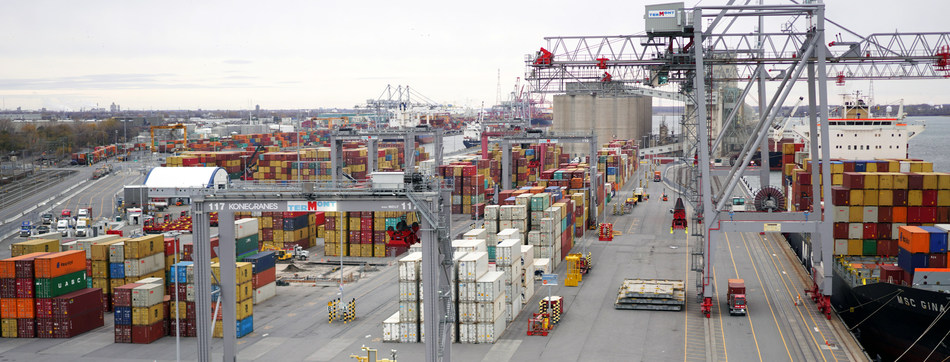
Port of Montreal Using Artificial Intelligence to Optimize Its Logistics Operations
July 22, 2020 - Thanks to artificial intelligence (AI), the Port of Montreal will be able to benefit from a new predictive tool that optimizes port logistics, letting the Port improve its operational planning and positively impact the transit times for containerized cargo in the supply chain, especially for rail freight.
Daniel Dagenais, Vice-President, Operations at the Montreal Port Authority (MPA), stated: "This project is another critical milestone towards the ‘Smart Port’ vision we are implementing. It will benefit all stakeholders involved in the chain by reducing cargo delays and transit time while maximizing throughput to our major logistics hub.”
This AI solution aims to optimize freight train planning based on variables such as ship arrivals, rail car deliveries, storage capacity, workforce availability and more to achieve optimal fluidity.
The project is headed by the MPA in partnership with terminal operators Montreal Gateway Terminals Partnership and Termont Montreal Inc., as well as with EI Systems and Canscan. It was developed in collaboration with IVADO Labs, a startup specializing in the development of AI solutions with unique expertise in logistics.
This is the second project benefiting the MPA and funded by the Government of Canada through Supply Chain and Logistics Excellence AI (Scale AI), an investment and innovation cluster that accelerates the application of artificial intelligence for supply chains. It is noteworthy that last May, the Port of Montreal partnered in a project that makes it possible to use AI to accelerate the handling of goods deemed "critical" in the current COVID-19 pandemic.
SOURCE: Port of Montreal |
|
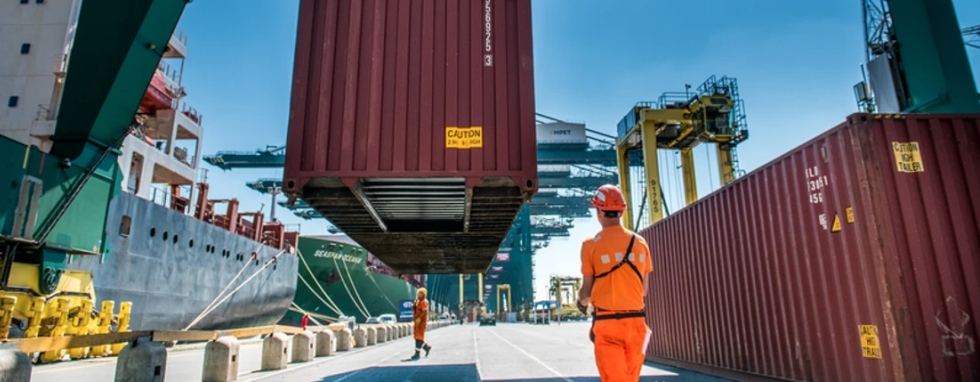
Port of Antwerp Limits Damage During Corona Crisis
Total goods throughput down by 4.9%; first signs of recovery visible
July 8, 2020 - The total throughput of the Port of Antwerp fell by 4.9% in the first half of the year compared to the same period in 2019. After a strong first quarter, the port experienced a decline in the transhipment of all flows of goods, with the exception of the container sector. Despite the impact of the coronavirus crisis on global production and logistics chains and a pandemic-driven drop in demand, the port remained 100% operational.
Container traffic status quo
Container traffic increased in the first quarter of the year, but felt the effects of cancelled sailings from April onwards. Nevertheless, for the period January-June 2020, container traffic recorded a slight increase of +0.4% in TEUs compared to the same period last year (with April and May 2019 as absolute record months). The number of calls made by vessels decreased, but this was compensated by a higher average volume per vessel and by additional calls on top of the normal sailing schedules. Notable climbers in this special period were the transhipment of pharmaceutical products, e-commerce and health foods. At the beginning of June, the port also welcomed the world's newest largest container ship, the HMM Algeciras with a capacity of 23,964 TEU.
Slight recovery in breakbulk sector in June
Since mid-2019, global trade issues continue to adversely affect goods flows in the conventional breakbulk sector. This has culminated in an overall 29% decrease for the period January-June compared to 2019, with inbound and outbound flows being affected to the same extent. The throughput of iron and steel, the most important freight group within this sector, experienced its best month of 2020 in June but a total decrease of 33.1% for the first six months of this year.
The automotive sector was already struggling in 2019 with the introduction of stricter rules on passenger car emissions in Europe and this trend continued in 2020. From March onwards, the coronavirus crisis only compounded this situation: less exports of new European cars, less supply of new Asian cars and downtime in the second-hand market due to travel restrictions. As a result, the total RoRo throughput fell by 21.8%.
Bulk cargo declined due to reduced demand for energy
While the transhipment of coal continued to grow in the first quarter, it came to a standstill in the second quarter. This resulted in a 13.1% drop in dry bulk transhipment in January-June 2020 compared to the same period last year. This decrease is partly attributable to the growing supply of green energy, which reduced the need for coal, partly by reduced demand for coal from the steel sector and partly by a strong second quarter in 2019. Fertilisers, which represent the largest share of dry bulk volumes, grew slightly (+1%) compared to January-June 2019.
Liquid bulk decreased by 7.5% compared to the first half of 2019 because of the coronavirus crisis, which wiped out demand for oil products, combined with price wars. Thanks to the gradual lifting of the coronavirus measures and the recovery of the oil price, fuel throughput increased in May and June. Moreover, chemicals decreased by 8.9% compared to the first six months of 2019, mainly due to reduced demand from the automotive sector.
Seagoing vessels
Over the past six months, 6,797 seagoing vessels called at Antwerp, representing a decrease of 5.6% compared to the same period in 2019. The gross tonnage of these vessels fell by 7.9% to 193 million.
Port of Antwerp grants postponement of payment
Following discussions with the Antwerp port community about the consequences of the coronavirus crisis, the Port Authority decided to grant a postponement of payment for the shipping and inland navigation dues and for the domain concessions.
Impact coronavirus and prospects
For the third quarter, while the Port of Antwerp is still expecting blank sailings, it is also seeing the first signs of recovery and an upturn in the European economy. The Port of Antwerp is making every effort to continue to ensure the efficient functioning of the port.
ABOUT PORT OF ANTWERP
As Europe's second-largest port, the Port of Antwerp is a major lifeline for the Belgian economy: more than 300 line services to over 800 destinations ensure global connectivity. The Port of Antwerp annually handles around 238 million tonnes of international maritime freight, and is home to Europe's largest integrated chemical cluster.
SOURCE: Port of Antwerp
|
|
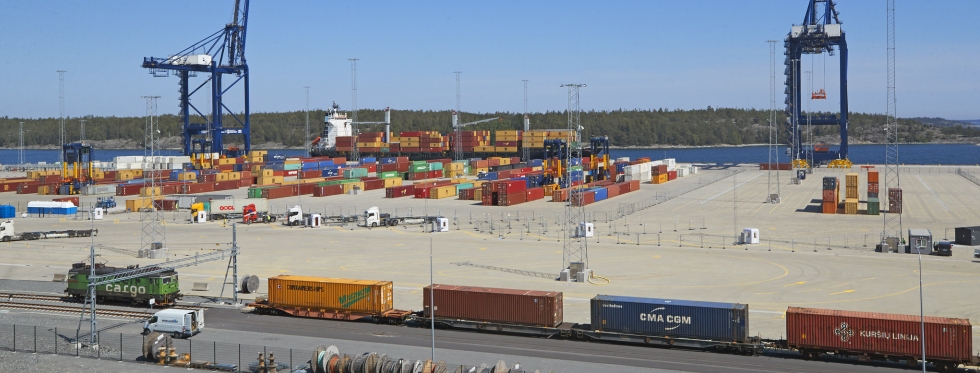
Newly Established Stockholm Norvik Port Handles Its First Export of Forest Products
June 22, 2020 - Sweden’s newest freight port handled its first export of forestry products in mid-June. Stockholm Norvik Port, which opened in May, has the capacity and service capabilities to efficiently meet the goods transport needs of the Swedish export industry.
Together with the freight forwarding and logistics company Holship Sverige AB, Stockholm Norvik Port handled export of the first container-load of forestry products, bound for Lat Krabang in Thailand.
“Shipping forestry products via Stockholm Norvik Port is a great solution for the Swedish export industry. Imports have predominated in Stockholm, which has generated an excess of empty containers. Entering into this collaboration means that we can now turn this around and focus on exports from Stockholm,” explains Daniel Hermansson, Managing Director of Holship Sverige AB.
Directly from the start, the newly-built Stockholm Norvik Port, with its unique location, plays a vital role for the Swedish export industry. Half of all consumption in Sweden happens in the Stockholm region.
“Sweden currently has a shortage of empty containers and the Swedish export industry’s need for these is obvious. As a major import port with an excess of empty containers, we can make a significant difference. Instead of moving containers around, over the whole of Sweden, Stockholm Norvik Port can contribute to more sustainable and cost-efficient handling,” says Markus Johansson, Ports of Stockholm's Operational Manager at the Port of Nynäshamn.
Stockholm Norvik Port has been built to meet the needs of the future and can welcome the very largest vessels operating in the Baltic Sea.
“With Stockholm Norvik Port we have the capability to grow and to meet the needs of the Swedish export industry for functioning infrastructure, not only now but also in the future,” says Johan Wallén, Marketing and Sales Manager at Ports of Stockholm.
The container terminal at Stockholm Norvik Port has replaced the container terminal at Stockholm’s Frihamnen port. It is run by Hutchison Ports, one of the world’s largest container terminal operators, with 52 ports in 27 countries. The RoRo terminal for rolling goods will be run by Ports of Stockholm and is scheduled to open during the autumn.
SOURCE: Ports of Stockholm
|
Dutch Seaports Win International Award for Sustainability
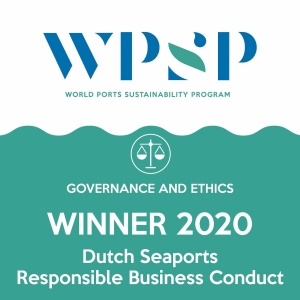 June 24, 2020 (Joint Press Release) - The Dutch seaports of Rotterdam, Amsterdam, Terneuzen/Vlissingen, Moerdijk, and Groningen have jointly won the ‘World Ports Sustainability Award’. They received the award for a joint project aimed at the application of OECD guidelines for seaports. These government guidelines concern corporate social responsibility in international business. The seaports examined how they could contribute to making occasionally risky cargo flows more sustainable. June 24, 2020 (Joint Press Release) - The Dutch seaports of Rotterdam, Amsterdam, Terneuzen/Vlissingen, Moerdijk, and Groningen have jointly won the ‘World Ports Sustainability Award’. They received the award for a joint project aimed at the application of OECD guidelines for seaports. These government guidelines concern corporate social responsibility in international business. The seaports examined how they could contribute to making occasionally risky cargo flows more sustainable.
The Seaports Trade Organisation (Brancheorganisatie Zeehavens, BOZ) has examined how seaports can influence — from their position in the supply chain — the process of making cargo flows sustainable. These cargo flows sometimes involve risks such as environmental damage, human rights violations or exploitation. Such risks are also referred to as International CSR risks: International Corporate Social Responsibility.
On the basis of the OECD Guidelines for Multinational Enterprises, the BOZ has examined the role and responsibility of seaports as one of the many links in the supply chain. It has also examined how seaports can contribute to reducing the international CSR risks for cargo flows processed in or transiting through the ports. The seaports have used the results of this study to identify the international CSR risks and to list the arsenal of measures available to seaports. The project exemplifies how the port community can make a positive contribution to making cargo flows more sustainable.
The study was part of the Work Programme Seaports in which the BOZ, consisting of Port of Rotterdam, Port of Amsterdam, North Sea Port, Port of Moerdijk, and Groningen Seaports, worked together with the Dutch Ministry of Economic Affairs and Climate Policy and the Dutch Ministry of Infrastructure and Water Management.
Koen Overtoom, CEO of Port of Amsterdam, responded with great pleasure on behalf of the Dutch seaports: “The Sustainability Award represents an important recognition of the efforts of the Dutch seaports by the International Association of Ports and Harbours (IAPH). This award therefore constitutes a significant honour for us.
“The project has strengthened the cooperation between the seaports in the area of sustainability. This cooperation will strengthen us permanently in our shared ambitions to achieve progress in making a number of international supply chains more sustainable.
“We will also continue talks with the Dutch Ministry of Foreign Affairs and the Dutch Social and Economic Council on the topic of International CSR and the further elaboration of this theme.”
Programme Background
The International Association for Ports and Harbours (IAPH), the alliance for the global port community, launched the World Ports Sustainability Program in 2018. The ports collaborate internationally within the IAPH by exchanging knowledge and experience concerning sustainable development in the international port community. Since 2018, the World Ports Sustainability Awards have been awarded annually for best practices. The Dutch seaports received the Award in the category of Governance and Ethics. The Awards are presented annually during the annual IAPH World Ports Conference. This conference was slated to take place in Antwerp, Belgium, in 2020, but has been cancelled due to the coronavirus disease (COVID-19) pandemic. The awards are now presented digitally to the winners, including the Dutch seaports.
SOURCE: Port of Rotterdam |
|
|